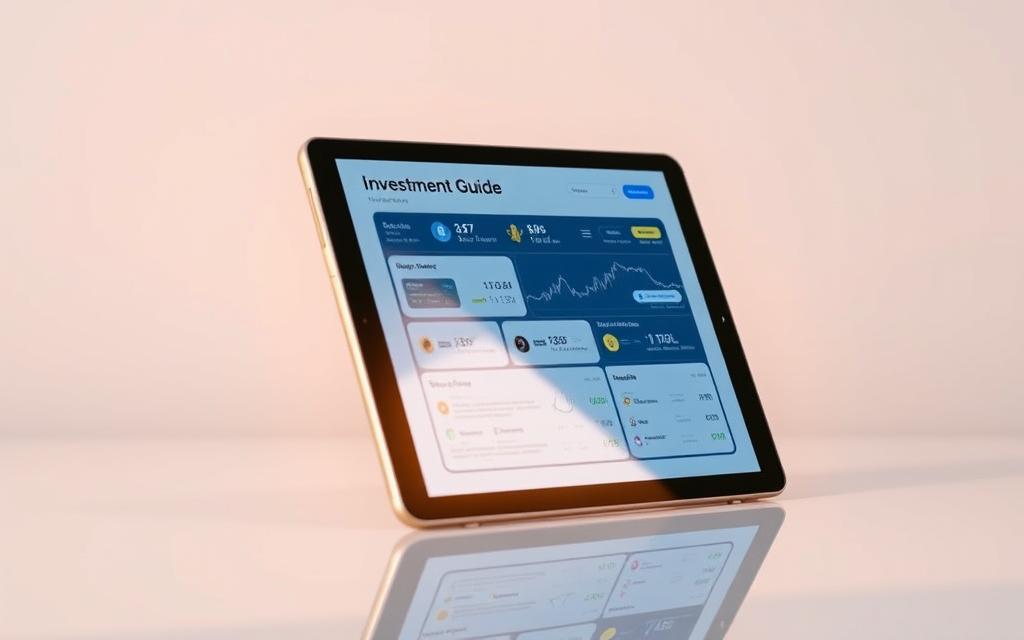Cryptocurrency has revolutionised finance, offering a digital alternative to traditional money. Over two million UK adults now hold cryptoassets. Understanding how to access cryptocurrency is becoming crucial in today’s digital world.
The digital currency market offers exciting opportunities and significant challenges. Bitcoin’s value has soared from pennies to over £89,000 per unit. However, potential investors must tread carefully in this high-risk market.
The UK offers various ways to buy cryptocurrency. These include payment apps, exchanges, and Bitcoin ATMs. Worldwide, there are over 34,000 Bitcoin ATMs. Be aware that fees can reach about 20% of the transaction value.
You can buy cryptocurrency in small amounts. This makes it accessible to investors with different budgets. Understanding storage methods, security, and market volatility is crucial.
Investors must choose how to protect their digital assets. Options include hot wallets, cold storage, and exchange-based solutions. Each method has its own pros and cons.
Navigating the cryptocurrency world requires careful consideration. It’s essential to research and understand the risks before diving in. Stay informed and cautious to make wise decisions.
Understanding Cryptocurrency Fundamentals
Digital finance has transformed with cryptocurrency basics. These innovative assets reshape our view of money. They offer a decentralised approach to financial transactions, challenging traditional banking.
Cryptocurrency is a revolutionary digital currency operating independently of central banks. Its total market value is about $2.4 trillion. This has drawn global attention to these digital assets.
What is Cryptocurrency?
Cryptocurrency is a digital currency secured by blockchain technology. It has several key features.
- Decentralised network without central authority
- Cryptographic security mechanisms
- Transparent transaction records
- Global accessibility
The Role of Blockchain Technology
Blockchain technology is the backbone of digital assets. This distributed ledger system ensures transparency, security, and immutability of transactions. It records each transaction across a network of computers.
This system makes fraudulent activities extremely difficult. It provides a secure foundation for cryptocurrency operations.
Types of Digital Assets
The cryptocurrency world includes various digital asset types:
- Payment Tokens: Bitcoin (market cap ~$600 billion)
- Utility Tokens: Ethereum
- Stablecoins: Tether
There are about 5,000 to 7,000 cryptocurrencies available. This gives investors many options to choose from.
The top five cryptocurrencies make up over 80% of the total market value. This shows the concentration of value in this new market.
Cryptocurrencies are not just a financial instrument, but a technological revolution challenging traditional monetary systems.
How to Access Cryptocurrency
Buying digital assets requires knowledge of key cryptocurrency platforms. In the UK, crypto exchanges are the main gateway for investors to purchase digital currencies.
Choosing the right exchange is vital for successful crypto investing. The UK market offers several trusted platforms for easy trading of digital currencies.
- Popular UK-friendly cryptocurrency exchanges include:
- eToro
- Coinbase
- Binance
When picking crypto brokers, investors should weigh up a few key points. These include security, fees, and available cryptocurrencies.
Other important factors are user experience and fiat currency transfer options. Careful platform choice can greatly affect your investment strategy.
- Security measures
- Transaction fees
- Available cryptocurrencies
- User experience
- Fiat currency transfer options
The crypto world is ever-changing, with over 20,000 digital assets available in early 2023. Careful platform selection can significantly impact your investment strategy.
| Exchange | Key Features | Sterling Transfer |
|---|---|---|
| eToro | Social trading platform | ✓ |
| Coinbase | User-friendly interface | ✓ |
| Binance | Wide cryptocurrency selection | ✓ |
UK investors should note that the crypto market lacks regulation. This means there are potential risks without Financial Services Compensation Scheme protection.
Popular Cryptocurrency Storage Methods
Safeguarding digital assets requires understanding various crypto wallet solutions. Investors must choose storage methods that balance security and accessibility. Careful selection is crucial for protecting crypto investments.
Crypto wallets are digital vaults for storing and transacting digital currencies. These essential tools come in different formats. Each type has unique features and security levels.
Hot Wallets vs Cold Storage
Two main storage approaches dominate the crypto wallet landscape:
- Hot Wallets: Internet-connected wallets offering quick transactions
- Free to use
- Instant access
- Higher security risks
- Cold Storage: Offline wallets providing enhanced security
- Cost: £50-£250
- Reduced hacking vulnerability
- Ideal for long-term holdings
Exchange-Based Storage Solutions
Crypto exchanges offer convenient storage options. Coinbase Wallet supports over 100,000 digital assets. Crypto.com DeFi Wallet stores 350+ cryptocurrencies and offers interest-earning features.
Hardware Wallet Options
Hardware wallets are the gold standard for secure crypto storage:
- Ledger Nano S Plus (£79): Supports 100 simultaneous apps
- KeepKey (£78): Stores 7,200+ crypto assets
- SafePal (£49.99): Supports 10,000+ crypto assets
Serious traders prefer non-custodial wallets for direct asset ownership. Recovery phrases are vital for both hot and cold wallets. They ensure access to funds if primary access is lost.
Security Measures for Crypto Assets
Protecting digital assets is vital in the unpredictable cryptocurrency world. Investors must use strong security strategies to guard their digital wealth. Cyber threats are always changing, so staying vigilant is key.
The Financial Conduct Authority (FCA) cautions that cryptoassets are unregulated and risky. Understanding security fundamentals is crucial for any crypto investor.
Essential Security Practices
- Implement two-factor authentication (2FA) on all crypto accounts
- Use hardware wallets for long-term crypto storage
- Create strong, unique passwords for each platform
- Regularly update wallet software and firmware
Crypto safety needs a layered approach. Hardware wallets offer better protection against breaches. Popular options include Ledger Nano X (£119-£149) and Trezor Model T (£185-£220).
“Security is not an option, it’s a necessity in cryptocurrency investing.”
Investors should know about common security risks. These include phishing attacks, fake wallets, and social media scams. Ethereum’s blockchain technology adds security through its proof-of-stake method.
Key Security Recommendations
- Maintain offline cold storage for majority of assets
- Use multi-signature wallets
- Conduct regular security audits
- Stay informed about latest security threats
Following these crypto safety guidelines can greatly reduce theft risk. It helps protect your cryptocurrency investments. Stay informed and use best practices to keep your digital assets safe.
Trading and Investment Strategies
Crypto trading needs smart planning and strategic thinking. Successful investment strategies balance risk management with informed choices. These approaches help navigate the ever-changing digital currency landscape.
Market Analysis Techniques
Market analysis is vital in cryptocurrency trading. Investors can use two main analytical methods:
- Fundamental Analysis: Evaluating the intrinsic value of cryptocurrencies
- Technical Analysis: Studying price charts and market trends
Portfolio Diversification Strategies
Clever investors spread risk across different digital assets. Solid cryptocurrency investment strategies suggest:
- Limiting crypto investments to 1-5% of total portfolio
- Selecting cryptocurrencies with proven track records
- Balancing high-risk and stable digital assets
Risk Management Approaches
Safeguarding your investments requires disciplined risk management techniques:
| Strategy | Description |
|---|---|
| Dollar-Cost Averaging | Investing fixed amounts at regular intervals |
| Stop-Loss Orders | Automatically selling to limit potential losses |
| Emergency Fund | Maintaining savings before crypto investments |
The crypto market’s ups and downs require a well-planned approach. Sound market analysis, clever diversification, and effective risk management are key.
These strategies can boost investor confidence in the exciting world of digital currencies. With the right tools, you can make smarter choices in this dynamic market.
Using Cryptocurrency for Transactions
Digital currency transactions are changing how we handle money. About 46% of users now use crypto for purchases and transfers. This shows a rapid growth in cryptocurrency adoption.
Big companies now accept digital currencies as payment. PayPal, Overstock, Starbucks, and AMC Theaters have embraced this new financial technology. This shift marks a significant change in how we pay.
- Over 15,000 businesses worldwide accept Bitcoin payments
- Around 20% of U.S. small businesses use cryptocurrency transactions
- Cryptocurrency transaction fees remain lower than traditional banking fees
Crypto payments offer lower costs for international transfers. They also provide better privacy for transactions. Blockchain technology keeps these digital exchanges secure and transparent.
A public ledger prevents unauthorised spending. This ensures that all cryptocurrency transactions are safe and trackable.
Digital currencies are reshaping global financial interactions, offering unprecedented transaction flexibility and efficiency.
The Financial Conduct Authority oversees cryptocurrency exchanges. They ensure strong anti-money laundering measures are in place. Despite price swings, more people are using cryptocurrencies every day.
Experts predict that digital currencies will become part of our daily finances. Investors should know about possible tax effects. The IRS views cryptocurrency as property and tracks all transactions closely.
Conclusion
The cryptocurrency future offers exciting opportunities and challenges for digital asset management. Since 2009, the landscape has transformed, with over 25,000 cryptocurrencies now available. Investors must approach crypto investments with careful research and strategy.
The complex ecosystem has inherent risks and potential rewards. Market volatility can cause substantial price fluctuations. Regulatory uncertainties impact trading and market stability, making informed decisions crucial.
UK investors benefit from FCA-registered platforms for added security. Cryptocurrencies aren’t protected by the Financial Services Compensation Scheme but offer unique diversification opportunities. Profits may be subject to Capital Gains Tax, so keep accurate financial records.
Continuous learning is essential as the cryptocurrency landscape evolves. The digital currency world reshapes financial interactions, offering innovative approaches to transactions and investments. Stay informed and manage risks to navigate this dynamic frontier confidently.












